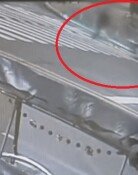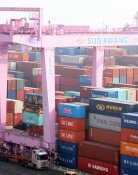New Type of Inter-Korean Economic Cooperation
New Type of Inter-Korean Economic Cooperation
Posted July. 13, 2005 04:12,
The 10th inter-Korean economic talks which were concluded on the morning of July 12 opened a new chapter in economic cooperation between the two Koreas.
The two Koreas agreed on 12 points such as the North and South Korean economic survey missions visiting each other during November, the forming and managing of a working group on science and technology, constructing infrastructure on one million pyeong at an earlier date as the first phase in building the main complex of the Gaesong Industrial Complex, having a fifth round of maritime transport working-level contacts at Munsan, Gyeonggi Province from August 8 to 10, and joint research on Imjin River flood prevention in late August.
Though talks progressed smoothly, the delegations had to negotiate into the night at the end as the opinion gaps between the two sides were not narrowed easily. The eleventh inter-Korea economic talks will be held from September 28 to October 1 in Pyongyang.
Three New Inter-Korean Projects-
A new type of economic cooperation gained much attention at the talks.
The main points of the new economic cooperation beginning next year are that South Korea will provide the necessary raw materials in producing clothes, shoes and soap while the North guarantees South Koreas investments in underground resource development such as iron, magnesite, apatite concentrates, and coal, and provides products.
A government official explained the significance of this, saying, While providing necessities or supporting light industries for the North is immediately possible, it will take a long time to develop North Koreas natural resources. Therefore, this is not simultaneous and equivalent support but complementary economic cooperation.
The inter-Korean fishery cooperation working-level talks being held from July 25 to 27 in Gaesong are a channel to discuss joint fishing, fish-breeding, and marine product processing. It is expected to contribute to guaranteeing the peace in the Yellow Sea and mutually benefit fishermen in the two Koreas. The marine traffic cooperation working-level contacts for guaranteeing access to the Jeju strait for private North Korean ships is also expected to open a new chapter in inter-Korean economic cooperation.
Last-Minute Difficulty in Reaching an Agreement-
Government officials originally estimated that an agreement would be announced on July 11 at 7:00 p.m., but the actual announcement came on July 12 at 7:00 a.m.
The government explained that the 12-hour delay was because discussions on new fields lasted longer than expected, and the Northern delegation took time to receive instructions from its government.
Park Heung-ryul, the spokesman of the South Korean delegation, explained, At this meeting, it was hard to adjust opinions on the new types of economic cooperation that were discussed for the first time.
However, another Unification Ministry official said, [Talks were delayed] because North Korea once again returned to its past attitude of the more we prolong things, the more we get, suggesting that the North was once again using a policy of brinksmanship.
It is known that clarifying the wording regarding distribution transparency on the agreement to provide 500,000 metric tons of rice also slowed down the talks. The existing food aid agreement states that when every 100,000 metric tons of rice is delivered, the distribution is checked more than once in the eastern and western sea, and in inland districts, respectively. It seems the North strongly opposed the checks being strengthened to twice in the eastern and western sea.
Hyung-June Park taewon_ha@donga.com lovesong@donga.com







